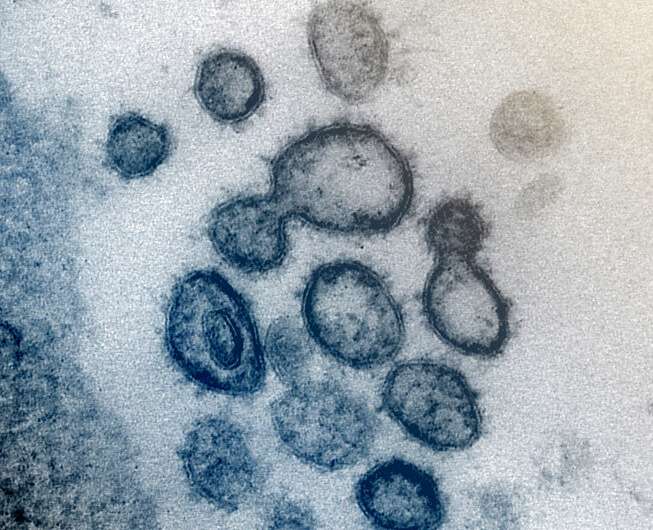This transmission electron microscope image shows SARS-CoV-2 -- also known as 2019-nCoV, the virus that causes COVID-19 -- isolated from a patient in the US. Virus particles are shown emerging from the surface of cells cultured in the lab. The spikes on the outer edge of the virus particles give coronaviruses their name, crown-like. Credit: NIAID-RML
South Korea's total number of novel coronavirus cases—the largest outside China, where the disease first emerged—passed 6,000 on Thursday as authorities announced a ban on face mask exports and other moves to try to ensure broader supply.
Japan is to impose two weeks' quarantine on arrivals from its neighbour, the Yomiuri daily reported, while Australia announced an entry ban on foreigners who have recently been in South Korea.
The two are the latest to take such measures—according to the foreign ministry in Seoul, 36 countries and regions have entry bans, while 22 require quarantine, as do several parts of China.
Total infections stood at 6,088, the Korea Centers for Disease Control and Prevention said, up 467, with 35 deaths.
Prime Minister Chung Sye-kyun said face mask exports would be banned from Friday.
Masks have become standard wear throughout South Korea and demand has surged, with long queues forming as authorities struggle to ensure a sufficient supply.
South Korea makes 10 million masks a day and the government ordered manufacturers to supply 80 percent of their output—up from half previously—to post offices, pharmacies, and a nationwide agricultural co-operative for sale at a fixed low price.
To control demand, buyers will have to show identification and will be limited to two masks a week, vice finance minister Kim Yong-beom told reporters.
Masks can be bought at other outlets but prices vary wildly and some sellers have been accused of illegal hoarding.
Current production was "far short of meeting the demand", Kim said, adding the government was looking to increase it to 14 million masks a day.
President Moon Jae-in apologised for the shortages earlier this week.
Authorities have also advised people to reuse masks as long as they visited places with little risk of infection.
Nearly 90 percent of South Korea's cases are in the southern city of Daegu—with more than 4,300 cases confirmed there—and the neighbouring North Gyeongsang province.
Most of the country's infections are linked to the Shincheonji Church of Jesus, a religious sect often condemned as a cult.
A 61-year-old woman member in Daegu developed symptoms on February 10 and attended at least four services before being diagnosed.
Scores of events—from K-pop concerts to sports seasons—have been cancelled or postponed over the contagion, with school and kindergarten breaks extended by three weeks nationwide.
The government on Thursday lengthened a nationwide daycare centre closure for a further two weeks.
In a survey on the impact of the coronavirus, the American Chamber of Commerce in Korea said only nine percent of its member companies were working normally, while a total of 68 percent said the business environment was "somewhat worse" or "much worse" than last year.
© 2020 AFP






















